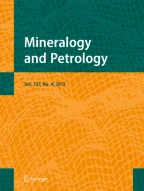Abstract
Y-rich hainite occurs in nepheline syenite pegmatite of the Sakharjok massif (Kola Peninsula, Russia). It forms euhedral prismatic crystals up to 2 mm in length as well as rims around an unidentified mineral phase (silicate of Ca, Y, Zr and Ti). The mineral is triclinic, space group P-1, a 9.6054(10), b 5.6928(6), c 7.3344(7) Å, α 89.903(2), β 101.082(2), γ 100.830(2)°, V 386.32(7) Å3, Z = 1. The calculated density is 3.39 g/cm3. Chemical composition of Sakharjok hainite is different from the previously published data by much higher Y and Nb contents up to 0.72 and 0.20 atoms per formula unit, respectively, by the two- to five-fold depletion in the LREEs and by the strong enrichment of the HREEs. From the single-crystal X-ray diffraction data, there is a significant amount of Y in the M1 site associated with the absence of Zr in it. Nb and Zr are concentrated in the M5 site substituting Ti. Combination of single-crystal X-ray diffraction data and electron microprobe data give the empirical formula (Ca1.04Y0.63REE0.24Mn0.02)∑1.93(Na0.92Ca0.77)∑1.69Ca2.00(Na0.65Ca0.10)∑0.75(Ti0.60Zr0.21Nb0.15Fe0.03)∑0.99((Si4.00Al0.02)∑4.02O14) (F2.61O1.39)∑4.00.
Similar content being viewed by others
Notes
Cations sites are named after Christiansen et al. (2003).
References
Atencio D, Coutinho JMV, Ulbrich MNC, Vlach SRF, Rastsvetaeva RK, Pushcharovsky DY (1999) Hainite from Poços de Caldas, Minas Gerais, Brazil. Can Mineral 37:91–98
Batieva ID, Bel’kov IV (1984) The Saharjok alkaline intrusion: rocks and minerals. Kola Branch, USSR. Acad. Sci., Apatity, 133 pp [in Russian]
Bellezza M, Merlino S, Perchiazzi N (2004) Chemical and structural study of the Zr, Ti-disilicates in the venanzite from Pian di Celle, Umbria, Italy. Eur J Mineral 16:957–969
Blumrich J (1893) Die phonolithe des Friedländer Bezirkes in Nordböhmen. Tschermaks Mineral Petrogr Mitt 13:465–495
Bulakh AG, Kapustin YL (1973) Götzenite from alkaline rocks of Turii Peninsula (Kola Peninsula). Zap Vses Mineral O-va 102:464–466, [in Russian]
Cannillo E, Mazzi F, Rossi G (1972) Crystal structure of götzenite. Soviet Physics, Crystallog 16:1026–1030
Christiansen CC, Johnsen O, Makovicky E (2003) Crystal chemistry of the rosenbuschite group. Can Mineral 41:1203–1224
Cundari A, Ferguson AJ (1994) Appraisal of the new occurrence of götzeniteSS, khibinskite and apophyllite in kalsilite-bearing lavas from San Venanzo and Cupaello (Umbria), Italy. Lithos 31:155–161
Giester G, Pertlik F, Ulrych J (2005) Die Kristallstruktur des Minerals Hainit. Mitt Österr Mineral Ges 151:45, [in German]
Guimarães D (1948) The zirconium ore deposits of the Pogos de Caldas plateau, Brazil, and zirconium geochemistry. Instituto de Tecnologia Industrial, Boletim 6
Johan Z, Čech F (1989) New data on hainite, Na2Ca4[(Ti,Zr,Mn,Fe,Nb,Ta)1.50□0.50](Si2O7)F4 and its crystallochemical relationship with götzenite, Na2Ca5Ti(Si2O7)2 F4. C.R. Acad. Sci. Paris 308, series II: 1237–1242 [in French, with extended English abstract]
Kapustin YL (1980) Götzenite and wöhlerite from alkaline massif of Sangilen (Tuva). Zap Vses Mineral O-va 109:594–599, [in Russian]
Lyalina LM, Savchenko YE, Selivanova EA, Zozulya DR (2010) Behoite and mimetite from the Saharjok alkaline pluton, Kola Peninsula. Geology of Ore Deposits 52:641–645
Lyalina LM, Zozulya DR, Savchenko YeE (2014) Diversity of britholite group minerals in nepheline-feldspar pegmatite from Sakharjok massif, Kola Peninsula. Geologiya i strategicheskie poleznyie iskopaemyie Kolskogo regiona. Trudy XI Vserossiyskaya Fersmanovskaya nauchnaya sessiya:97–101 [in Russian]
Rastsvetaeva RK, Pushcharovskii DY, Atencio D (1995) Crystal structure of giannetite. Crystallography Reports 40:574–578
Rønsbo JG, Sørensen H, Roda-Robles E, Fontan F, Monchoux P (2014) Rinkite-nacareniobsite-(Ce) solid solution series and hainite from the Ilímaussaq alkaline complex: occurrence and compositional variation. Bull Geol Soc Den 62:1–15
Sharygin VV, Stoppa F, Kolesov BA (1996) Zr-Ti disilicates from the Pian di Celle volcano, Umbria, Italy. Eur J Mineral 8:1199–1212
Sheldrick GM (2008) SHELXS, SHELXL. Acta Crystallogr A64:112–122
Sokolova E (2006) From structure topology to chemical composition. I. Structural hierarchy and stereochemistry in titanium disilicate minerals. Can Mineral 44:1273–1330
Sokolova E, Cámara F (2013) From structure topology to chemical composition. XVI. New developments in the crystal chemistry and prediction of new structure topologies for titanium disilicate minerals with the TS block. Can Mineral 51:861–891
Sun SS, McDonough WF (1989) Chemical and isotopic systematics of oceanic basalts: applications for mantle composition and processes. In: Saunders AD, Norry MJ (eds) Magmatism in the ocean basins, special publication of the geological society 42. Geological Society, London, pp 313–345
Zozulya DR, Lyalina LM, Eby N, Savchenko YE (2012) Ore geochemistry, zircon mineralogy, and genesis of the Sakharjok Y–Zr deposit, Kola Peninsula, Russia. Geology of Ore Deposits 54:81–98
Zozulya D, Lyalina L, Macdonald R, Bagiński B, Savchenko Ye, Dzierżanowski P (2014) Genesis and alteration mechanisms of britholite group minerals from ore bodies related to the Keivy peralkaline granite-nepheline syenite complex, Kola Peninsula, NW Russia. Workshop on accessory minerals, University of Warsaw:43–44
Acknowledgments
We thank the referees F. Camara and N. Chukanov for their helpful comments about the manuscript. The study was supported by grant from St. Petersburg State University (No 3.38.136.2014). A. Zolotarev is grateful to President Federation Grant for Young Candidates of Sciences (MK-3296.2015.5).
Author information
Authors and Affiliations
Corresponding author
Additional information
Editorial handling: L. Bindi
Rights and permissions
About this article
Cite this article
Lyalina, L., Zolotarev, A., Selivanova, E. et al. Structural characterization and composition of Y-rich hainite from Sakharjok nepheline syenite pegmatite (Kola Peninsula, Russia). Miner Petrol 109, 443–451 (2015). https://doi.org/10.1007/s00710-015-0377-3
Received:
Accepted:
Published:
Issue Date:
DOI: https://doi.org/10.1007/s00710-015-0377-3
